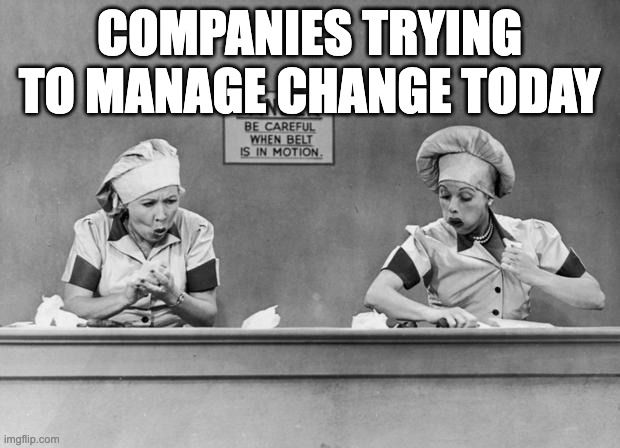Stop Fighting a Losing Game
- Robert Caldera
- Apr 12, 2024
- 2 min read

Is there a better analogy for how accelerated change impacts us today and our futile efforts to get it under control than Lucy and Ethel in the chocolate factory?
In this classic episode from I Love Lucy, the chocolates first come by at a manageable pace. Lucy and Ethel wrap them one by one. Ethel even says, “This is easy.” Then the conveyor belt speeds up, getting faster and faster. Lucy and Ethel do their best to make sure none reach the end without getting wrapped. If that happens, they were warned, they would be fired.
Soon, wrapping each one becomes impossible at the speed they're passing by so they resort to eating the candies or stuffing them in their clothes – anything to prevent them from reaching the end unwrapped. Lucy remarks, “I think we’re fighting a losing game.”
An all-time classic TV moment becomes a lesson for handling change today.
As the conveyor belt sped up, they continued to approach things the same way, just faster – but still one candy at a time (or one change project at a time). The system in place for wrapping the candies wasn’t designed to handle that speed. Instead, the chocolate factory leadership should consider new ways of working (from strategic planning to operations and people development) that can handle all the chocolate (or change) coming at them at that speed.
Traditional change management wraps the chocolate one at a time. Maybe sometimes it factors in the number of chocolates passing each worker around the same time, but in the end, it still seeks to wrap each individually. Rarely does it take a systems view of how the entire organization is built (or not) to process rapid change.
Organizations were lamenting the speed of change even before Generative AI exploded on the scene. However, to continue the analogy, the conveyor belt has not yet reached full speed! The next decade-plus will make the present look like we’re moving in slow motion (just wait for quantum computing to become mainstream).
What should organizations do?
First, stop trying to manage change. Like Lucy said, it’s fighting a losing game. Elevate your approach to change to the C-suite as change (and its impacts) should be factored into strategy, risk management, organizational development, and more. Your culture and established ways of planning and working have more to do with how well you adapt to change than any change management methods employed.
From that perspective, consider a fresh approach (shown below) that combines the power of strategic foresight and agile change practices with visionary communications to build a change-ready enterprise. Reach out to Future|Shift Consulting to learn more!







Comments